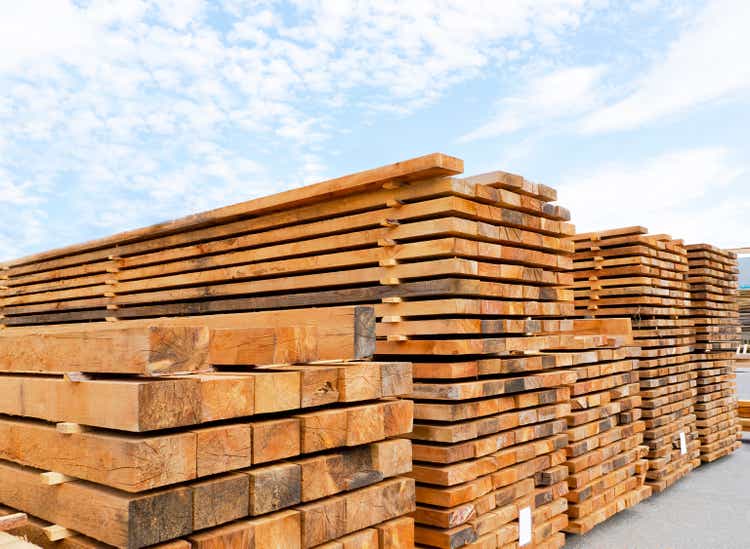Melena-Nsk/iStock via Getty Images
Shares of Boise Cascade (NYSE:BCC) have taken a tumble as of recently amidst reversing wood prices and concerns about demand, with rapidly rising interest rates casting a real shadow on the health of the housing market and the economy at large. Before we look at these trends and their impact, let’s first have a detailed look at the business.
Who Is Boise?
Boise is pretty much a vertically integrated products (wood) business which is comprised out of two units. With the wood product business, Boise is a leading manufacturer of engineered wood products and plywood. This business generated nearly $2.0 billion in sales in 2021, up 49% on the year before, predominantly as a result of higher prices. This made that EBITDA of the unit triple to $586 million, as earnings of $531 million were impressive as well. Important to note, Boise is not a landowner with its own forests, rather it buys wood from private landowners, among others.
The company has a building materials business as well, basically a national wholesale distributor. With $7.2 billion in sales, the unit is much larger in terms of sales, but the value-add is much more modest, as EBITDA of $505 million actually lags the wood products business. While the distribution business is largely a wood business, it includes other product lines as well, such as insulation, doors, roofing, metal products, among others.
Following some intercompany consolidation, Boise overall generated $7.9 billion in sales in 2021 and $1.05 billion in EBITDA, as these numbers trail the sum of both segment results a bit.
With just 40 million shares outstanding, the huge profit boom, induced by record-high wood prices, translated into handsome earnings as the company earned about $18 per share in 2021, a huge number, given that shares now trade in their mid-sixties. The balance sheet is in excellent shape, as a net cash position of $305 million appeared by year-end 2021, equals to more than $7 per share! These excellent results are driven by the boom, but Boise believes in the long-term synergy between its own production facilities and distribution capabilities, hence the vertically integrated model.
Needless to say that current earnings power cannot be maintained as current EBITDA margins around 15% stand in sharp contrast to margins at 4-5% in 2018 and 2019, which were not too shabby years from a macroeconomic perspective. Furthermore, some of the strongest pricing has already come down in recent weeks, as this is, of course, still ahead of the impact from higher interest rates and quantitative tightening.
Some Perspective
Shares of Boise largely traded in a $15-$50 range over the last decade as strong pricing in 2021 triggered a big rally, with shares exchanging hands at $85 early in June. In the weeks since, shares lost $20, mostly on the back of concerns about higher interest rates and the wider consequences of that.
While earnings power has been huge, and the balance sheet has been strong, the valuation has still been somewhat modest. After all, at $65 per share, the market value stands at just $2.6 billion, or $2.3 billion, if we factor in net cash as well.
Operating momentum has still been very hot. Early in May, first quarter sales were posted at $2.3 billion as net earnings of $302 million translated into earnings of $7.61 per share, trending at more than $30 per annum. At this pace, the entire market cap would be earned in just two years. With net cash rising towards the half a billion mark, a $2.50 per share special dividend of $100 million is relatively modest, as more capital has been deployed by the business involving a substantial deal.
In June, the company announced a $512 million deal to acquire Coastal Plywood Company in a deal which is set to deplete the entire net cash position. Between this deal, the intermediate $2.50 per share dividend and retained earnings following a likely strong second quarter, realistic net debt probably comes in flat.
Unfortunately, few details have been announced on the deal, with no margin or revenue numbers displayed, which is a bit disappointing as the deal comes in at more than 20% of the current enterprise value.
What Now?
Right now, there are quite a few question marks on Boise Cascade. The biggest question mark is that of the normalized earnings power. Earnings, trending at $30 per share in the first quarter of 2022, will quickly come down as prices have retreated a bit already, and higher interest rates casting a real pressure on housing markets and eventually demand.
Even in the year 2020, which was not a shabby year, the company earned “just” $4 per share, earnings now generated in just about six weeks’ time. Note that even if earnings retreat from $30 to $4 per share equal to the earnings power in 2020, valuation multiples only come in at 16 times earnings. All of this, as net cash balances are largely flat, and this earnings power, still does not include a non-quantified earnings impact of the Coastal deal which is likely solid, while intermediate profits are much higher, of course.
Given all the factors described above, I recognize that the pullback in recent weeks has occurred as investors are rightfully worried about the near-term outlook for the business. On the other hand, the balance sheet is in pristine shape and even if earnings power falls back a huge deal, the business can still justify the current valuation. On the other hand, shares are still flat year to date despite the very challenging near- to medium-term outlook. Exactly this relative outperformance versus the market, and perhaps market conditions, makes me a bit cautious before pulling the trigger.


Be the first to comment